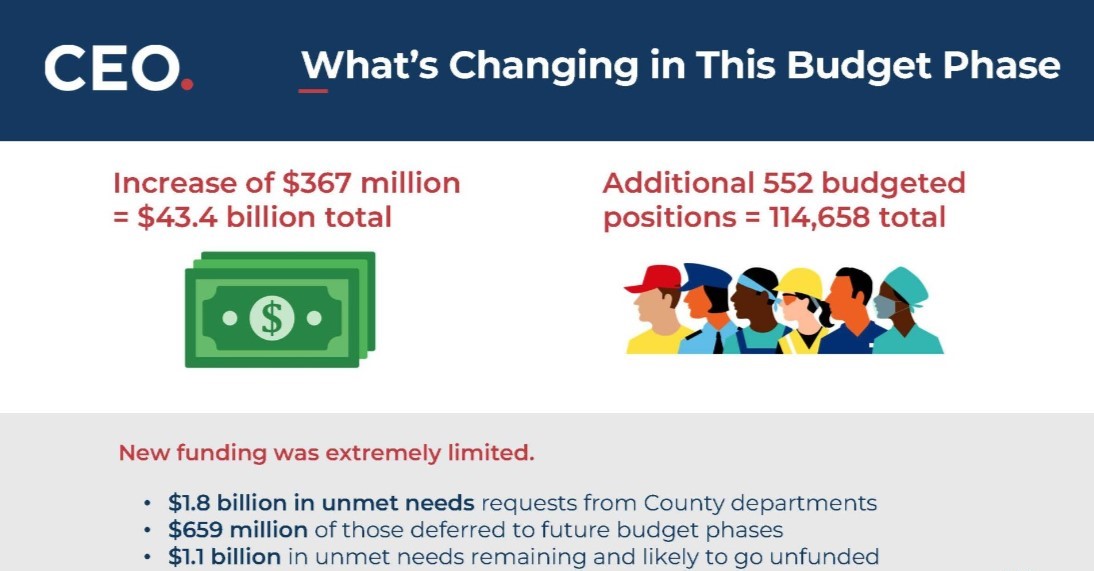In some of its final adjustments for the new fiscal year, the Los Angeles County Board of Supervisors this week added just $367 million to L.A. County’s 2023-24 Fiscal Year budget — less than 1 percent of the $43.4 billion total — despite having $1.8 billion in unmet needs. County officials cited several major factors in the budget stagnation.
The additional funds are mainly being used to continue addressing some of the critical needs in the county, including $117.8 million to restructure the county’s juvenile probation system, $52 million to help improve conditions and mental health services at county jails, and $16.3 million to fund landlord incentives to accept rent subsidy vouchers and other services geared towards the response to homelessness.
About $659 million of the unmet needs were deferred to future budget phases to be addressed, leaving about $1.1 billion in unmet needs likely to be unfunded.
Much of the staff presentation centered around the troubles in meeting fiscal needs. The $367 million comes not from county or city revenue but instead comes directly from the state and federal government.
“We are being forced to confront our budgetary limitations,” L.A. County CEO Fesia Davenport said in her presentation.
In that same vein, Davenport noted that the county saw no new revenue growth since the initial approval of the recommended budget in April, partly due to a slowdown in real estate sales.
In many cases, the CEO’s office will project lower property tax receipts than the county’s assessor, and that difference serves as added funding, Davenport said. However, the estimates this year were very similar to actual property tax revenue — the largest source of revenue for the county’s General Fund — which faced a decline.
In the first four months of this fiscal year, housing sales were down 40 percent from a year ago, and the Measure ULA “Mansion Tax” that was projected to bring in $56 million per month to fund homelessness programs only netted $3.6 million in its first month as the luxury property market froze following the implementation of the measure.
“We expect to see the impact of the slowing market in next year’s budget cycle,” Davenport said.
This slowdown comes as the county is facing a slew of lawsuits stemming from AB 218 — which significantly extended the statute of limitations for sexual assault cases involving minors — and other large legal settlements that are expected to reduce the county’s available funds.
Looking multiple years down the road, Measure H is set to sunset in 2027, leaving an approximately $500 million hole in the county’s homelessness response budget.
The state of the budget was a concern to several board members, including 2nd District representative Holly Mitchell. She emphasized the importance of transparency between both the board and staff as well as between county staff and its constituents.
She noted that there was a disconnect between what constituents thought was possible and what county staff could actually do from a legal perspective in part due to documents like the Youth Justice Reimagined report that the county is using as a guide to remodel its juvenile incarceration system.
One of the major recommendations from this report was the sweeping elimination of positions in the Probation Department, a move that Davenport says the city cannot make legally.
“We were trying to develop an implementation plan, but also correct the posture of the report,” Davenport said. “We were trying to explain that we can’t sweep all these positions. It says [to do it] in the report, there are some legal challenges.”
In terms of the budget itself, Mitchell expressed frustration with the continued emphasis on the Sheriff’s Department, which received a $400 million boost to its budget from the previous year’s recommendation to almost $3.85 billion.
“I think it’s a problem, as evidenced by many people we heard today,” Mitchell said. “We need to be surgical in how we assess [funds’] equitable applications.”
While this week’s effort was labeled as the “final” changes to the budget, a video shown to the supervisors and the public prior to the staff’s presentation explained that despite its name, these would not be the final changes to the budget, and the document will actually be finalized for submission to the state on October 3.
Photo/Image from County CEO Presentation
Stay informed. Sign up for The Westside Voice Newsletter
By clicking submit, you agree to share your email address with Westside Voice. We do not sell or share your information with anyone.








